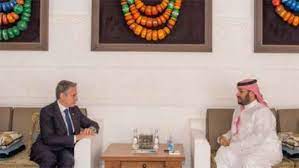The weight of China’s diplomatic efforts abroad
Utilizing its participation in international organizations, China uses multilateral diplomacy to achieve its stated goal of becoming a “modern socialist country that is prosperous, strong, democratic, culturally advanced, and harmonious” by 2049. China views the World Trade Organization (WTO), the International Monetary Fund (IMF), and the United Nations (UN) as helpful organizations in achieving its national goals at a period of rising unpredictability in international relations.

China is in favor of using the UN as the primary forum for governing international security. With $367 million, or 13% of the UN budget, it is the second-biggest donor (after the US). It pays 15%, or $900 million, of the UN peacekeeping budget and is the only one of the permanent five (P5) members of the UN Security Council (UNSC) to provide a significant number of soldiers (2,500 out of 95,000) for UN peacekeeping missions. As a prerequisite to the UN’s establishment in 1945, China was granted the right to exercise a veto over decisions made by the UN Security Council on risks to international peace and security, including terrorism. China can connect its bilateral and regional ties with both large and rising nations because to its P5 position.
China has vetoed 20 UNSC resolutions since August 1972, ten of which dealt with the Syria conflict. Aside from holding sway on UNSC views regarding the circumstances in North Korea, Taiwan, and Myanmar, China has typically exercised caution when it comes to the larger Asian picture. Due to this, the P5 members of NATO—France, the UK, and the US—have been able to control the UNSC’s decision-making process when it comes to Asian matters like the Israel-Palestine conflict, Yemen, Iraq, Iran, and Afghanistan.
Following President Xi Jinping’s announcement of the Global Security Initiative (GSI) in April 2022 and its demand for “indivisible security,” China’s standing in the UNSC may shift. The Shanghai Cooperation Organization (SCO), which has its headquarters in Beijing, welcomed the UN as a liaison office in 2017. The six GSI priorities support China’s stance as a defender of “UN values” via “dialogue and consultation,” drawing on the goals and tenets of the UN Charter.
The Saudi-Iranian reconciliation in March 2023 was made possible by China, which has been the most noteworthy result of the GSI so far. China has advocated for regional security frameworks for the Gulf and Afghanistan at UNSC sessions. In June 2023, it conducted the first trilateral security summit between China, Pakistan, and Iran in Beijing. China has taken over as the only Deputy Secretary-General of the Kazakhstan-based Conference on Interaction & Confidence-Building Measures in Asia (CICA) as of October 2023.
The establishment of an overland Asian strategic energy/trade corridor connecting the Gulf of Mexico and China by a pipeline, train, and digital communication is one possible effect of the GSI. Beijing would be able to avoid the South China Sea and the Straits of Hormuz and Malacca, which are now major hubs for marine traffic.
China has intentionally connected the UN’s Agenda 2030 and its 17 Sustainable Development Goals (SDGs) with its Global Development Initiative (GDI), which was introduced by President Xi at the UNGA in September 2021. The SDGs on ending poverty, food security (which is covered by China’s Global Food Security Initiative, which was presented at the G20 in Bali in 2022), industrialization and innovation, and climate financing are among the eight key areas of the GDI. Incorporating China’s infrastructure-driven Belt and Road Initiative (BRI), Digital Silk Road, and Global Data Security Initiative, the GDI has added the growing digital economy and connectivity to these.
China has made use of the UN’s financial and personnel resources to further Agenda 2030’s objectives. A 70-country “Group of Friends of GDI,” the majority of which are BRI partners, provides support for China’s $200 million UN Peace and Development Trust Fund and the $4 billion Global Development and South-South Cooperation Fund, both of which were announced in 2023 and overseen by the UN Secretary-General’s Office. With data sourced directly from UN offices worldwide, the UN’s Department for Economic and Social Affairs—which has been led by a Chinese Under-Secretary-General since 2007—is in charge of routinely monitoring the implementation of Agenda 2030.
China has prioritized the transition from a centrally planned to a “socialist market-oriented economy” ever since it joined the IMF in April 1980. China, with the IMF as its partner in “rules-based” international cooperation, has recognized “mutually beneficial” effects from this partnership, including “trust.” China’s renminbi was granted worldwide usage for trade and finance in November 2015, when it was added to the IMF’s Special Drawing Rights basket of currencies. China has a say in decisions since it is the IMF’s third-largest shareholder, after the US and Japan. China may now include its BRI and debt reduction programs in IMF assistance programs for nations experiencing economic crises.
Beijing joined the WTO in December 2001 and has three interests there. It ensures the most-favored country (MFN) status for its market access and deflects criticism of its dominating state-owned firms by using WTO accords as the relevant “rules-based order.” It takes part in the current WTO discussions to create “new rules,” especially with regard to the digital economy.
It defends “the rule of law” in accordance with the WTO Dispute Settlement Understanding as the means of preventing its trade partners—most notably, the US—from applying laws “extra-territoriallaws.” What’s more, China’s involvement in the 2020 Multi-Party Interim Appeal Arbitration Arrangement, which also involves the EU, Japan, Australia, and Singapore, effectively challenges the US goal of preventing new appointments to the WTO appellate body, so slowing down the expansion of the WTO’s dispute settlement system.
China is aware of the difficulties facing multilateralism in its multilateral diplomacy. After the November 2023 China-US summit, China said that “joining hands to meet global challenges and promote global security and prosperity” was its preferred course of action. To the harm of China’s fundamental interests, the alternative was a “zero-sum mentality” that would “drive the world toward turmoil and division.”






